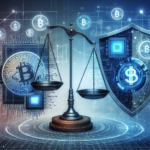The Concept of Decentralization
Defining Decentralization
Decentralization refers to the distribution of authority and decision-making processes away from a central governing body. In the context of tokenomics, this means empowering individual users or stakeholders rather than relying on a singular authority or company to control the ecosystem. The shift towards decentralization has gained traction with the rise of blockchain technology, enabling systems where individuals can participate in and contribute to the network without intermediaries.
A Deep Dive into Tokenomics
Tokenomics, or token economics, involves the study and design of the economic models behind cryptocurrencies or digital tokens. It encompasses how tokens are issued, distributed, and utilized within a given ecosystem. For effective tokenomics to flourish, decentralization plays a critical role in ensuring flexibility, inclusivity, and resilience in the economic model.
The Benefits of Decentralization in Tokenomics
Enhanced Security and Trust
One of the key benefits of decentralization is that it enhances security and trust among participants. When transactions are managed on a distributed ledger rather than through a central authority, the risk of fraud or misuse of power diminishes significantly. Every participant has access to the same information stored on the blockchain, which helps build trust within the community and reduces the likelihood of manipulation.
Increased Participation and Inclusivity
Decentralization encourages a wider range of participants to engage with the token ecosystem. By removing barriers associated with traditional financial systems, such as banking fees or geographic limitations, more individuals can access and utilize tokens. This inclusivity fosters a diverse participant base, leading to a richer and more vibrant economic environment.
Empowering Users
Decentralization shifts the power dynamics from a few centralized authorities to individual users. This empowerment allows users to have a say in decision-making processes related to the token’s future, governance, and more. Rather than being passive consumers, participants become active contributors, leading to more engaged communities.
Decentralized Governance Models
Understanding DAO
Decentralized Autonomous Organizations (DAOs) are a prime example of decentralization in practice. These organizations operate through smart contracts on the blockchain, enabling participants to vote on decisions using governance tokens. DAOs represent a new paradigm for managing organizations without the need for a centralized authority. This governance model enables a community-driven approach where each token holder has a voice proportional to their holdings.
Token Voting and Community Engagement
In decentralized governance models, the ability to vote using tokens not only empowers users but also incentivizes community engagement. If stakeholders have a direct influence on decisions, they are more likely to stay informed and contribute their perspectives. This participatory approach can lead to innovative solutions that would be less likely to emerge in a centralized framework.
The Role of Decentralization in Economic Resilience
Reducing Single Points of Failure
A decentralized tokenomic structure naturally mitigates risks associated with single points of failure. In a centralized system, the collapse or mismanagement of the central authority can lead to devastating consequences for the entire ecosystem. With decentralization, the failure of one component does not jeopardize the entire network. This resilience is crucial in maintaining trust and stability among users.
Adaptability to Market Changes
Decentralized structures facilitate a more organic and adaptable response to market conditions. Token holders can quickly signal shifts in demand or propose changes to the economy through voting without waiting for lengthy approval processes typical in centralized entities. This agility can be vital in maintaining competitive advantages and mitigating risks in an ever-changing market.
Challenges of Decentralization in Tokenomics
Coordination Complexities
While decentralization has many benefits, it also introduces challenges, particularly in coordination among stakeholders. With numerous voices and opinions to consider, decision-making can become cumbersome. Disagreements might slow progress and lead to fragmentation within the community. Finding effective mechanisms to streamline decision-making while still honoring the principles of decentralization is essential.
The Trade-Off Between Decentralization and Efficiency
A common dilemma in the design of tokenomics is balancing decentralization with efficiency. Some decisions may require swift action, which might be hindered by needing collective approval from a widespread participant base. Striking the right balance between ensuring inclusivity and maintaining a streamlined operational process is crucial to building successful decentralized networks.
Security Issues
Although decentralization enhances security overall, it is not devoid of risks. Smart contracts, while powerful, can be subject to vulnerabilities and exploits. This potential for security breaches or hacks poses a significant threat to decentralized networks. Users must exercise caution and rely on established protocols to minimize exposure to such risks.
Real-World Applications of Decentralization in Tokenomics
Cryptocurrency Projects
Numerous cryptocurrency projects exemplify the power of decentralization in their tokenomic structures. Ethereum, for example, employs a decentralized governance model that allows users to participate in decisions affecting the network. Additionally, platforms like MakerDAO utilize decentralized governance to facilitate the management of stablecoin protocols, enabling community-driven stability mechanisms.
Decentralized Finance (DeFi) Innovations
Decentralized Finance, or DeFi, is often hailed as a hallmark of decentralized tokenomics. By creating financial services without intermediaries, DeFi projects empower users to lend, borrow, and trade in a trustless environment. This openness has enabled a wave of innovation and cost efficiency previously unattainable in traditional finance.
Tokenized Communities and Social Networks
Beyond finance, decentralization has found applications in social networks and communities. Platforms built on blockchain technology often leverage token economies to incentivize contributions and promote engagement. Users can earn tokens based on their participation, which can be exchanged for various rewards, creating a self-sustaining ecosystem fueled by decentralized governance.
The Future of Decentralization in Tokenomics
Continuous Evolution and Adaptation
As the landscape of tokenomics continues to evolve, the importance of decentralization will remain at the forefront. New governance models and innovative applications will likely emerge, addressing existing challenges while enhancing user empowerment. The ongoing dialogue around decentralization’s role in shaping the future of finance, governance, and community organization is sure to be dynamic and ever-changing.
Integrating Advanced Technologies
The integration of advanced technologies, such as artificial intelligence and data analytics, could also play a role in enhancing decentralized structures. By combining these technologies with decentralized governance, it may be possible to streamline processes, enhance security measures, and facilitate better decision-making. The future promises exciting possibilities for the evolution of decentralized tokenomic structures.
In sum, the importance of decentralization in tokenomics is profound. Its ability to drive trust, inclusivity, resilience, and innovation defines the future of financial ecosystems and community engagement, paving the way for an exciting new era in the digital economy.








